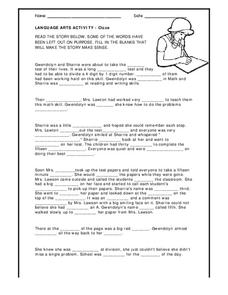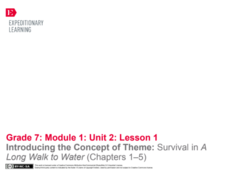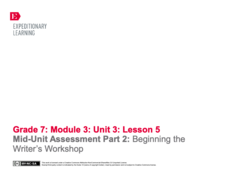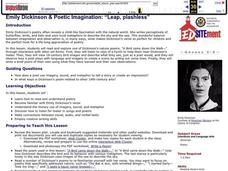Curated OER
Socratic Seminars in English Class
What is a Socratic Seminar? Discover this type of discussion and it functions. Split the class into two groups with Group A sitting in an inner circle and Group B in an outer circle. Each person in Group B is assigned to a person in...
Santa Ana Unified School District
The Power of Point of View
Sometimes a whole story can change based on the perspective of the person telling it. Practice identifying and analyzing point of view in various reading passages and writing assignments with a language arts packet, complete with Common...
Curated OER
Books for Teaching "All About Me!"
Students learn about experiences and feelings through books. In this lesson, students read a variety of books to aid in their understanding of life. Through a listing and brief synopsis of twelve books, students explore feelings,...
Curated OER
Rosencrantz and Guildenstern Are Dead: "Teach Each Other" Discussion
Challenge your class to hold a discussion about the theme of death in Rosencrantz and Guildenstern Are Dead without direct teacher guidance. After going over the discussion protocols and quotes from the text, learners move in a circle...
Teach-nology
Language Arts Activity - Cloze
Using context clues is an important skill when mastering reading comprehension. A cloze activity prompts learners to read each sentence in a short passage and fill in the blanks, based on what the rest of the sentence says.
Teach-nology
Elves in My Garden
Perfect for springtime, Christmas, or any other unit in which elves play in the garden, a cloze activity is a great addition to your language arts curriculum. As kids read the story, they fill in the blanks with words from the word bank.
Teach-nology
Editing Informal Letters
Editing a letter isn't quite the same thing as fixing an autocorrected word on your phone, but it's an important skill that can help kids with their language arts skills. Young readers take a look at a short letter before identifying the...
EngageNY
Looking Closely at Stanza 1—Identifying Rules to Live By Communicated in “If”
Here is a lesson plan in which pupils connect themes and rules to live by from the story Bud, Not Buddy by Christopher Paul Curtis to those found in the poem If by Rudyard Kipling. First, scholars discuss their reading and review Bud's...
Scholastic
Tell Us a Tale: Teaching Students to Be Storytellers
Encourage scholars to retell their favorite short story or folktale, adding personal details to make it their own. After reading their book of choice several times, story tellers retell a tale verbally to their classmates.
Digital Writing and Research Lab's – Lesson Plans
Teaching Close Reading through Short Composition/Revision
This activity may have writers evaluate short compositions, but their subjects are quite tall: great Americans. Pupils read one another's compositions and closely examine how specific phrases and diction contribute to shaping American...
EngageNY
Rereading and Close Reading: Communism, “The Vietnam Wars,” and “Last Respects” (Pages 85 and 86)
What might a papaya symbolize? Using the resource, scholars look for examples of symbolism in the novel Inside Out & Back Again. They also participate in a silent discussion called a Chalk Talk, writing their responses to a...
EngageNY
Analyzing Poems from Inside Out and Back Again to Develop Criteria for an Effective Poem
Scholars analyze a model poem to help guide their poetry writing. They use Think-Pair-Share to discuss word choice and meaning in "Papaya Tree" and "Wet and Crying." To finish, they use their discussions to collect evidence on what makes...
EngageNY
Analyzing a Thematic Concept: The Invisibility of Captives during WWII (Pages 182-188)
Readers complete a word web-based on the word dignity. They use their Understanding Invisibility note catcher to discuss how dignity relates to the theme of invisibility. After group discussion comparing invisibility and loss of dignity,...
EngageNY
Building Background Knowledge: The Lost Boys of Sudan
Get deep! Teach scholars how to make connections between texts to deepen their understanding of a topic. Using the resource, pupils read and annotate a short informational text about Sudan's Civil War and refugee crisis. Next, they...
EngageNY
Introducing the Concept of Theme: Survival in A Long Walk to Water (Chapters 1–5)
Teach the class how to survive! Scholars work together to learn the meaning of theme and determine the message in A Long Walk to Water. After the class discusses possible ideas, they work to identify one central theme for the text. The...
Roald Dahl
The Twits - The Wormy Spaghetti
What do spiders' legs and an octopus's eyeball have to do with metaphors? The fourth lesson in an 11-part unit designed to accompany The Twits by Roald Dahl uses disgusting foods to teach about metaphoric writing.
Curated OER
Introduce Vocabulary: Froggy Goes to School (London)
Just like your budding readers may have felt, Froggy is nervous on his first day of school. Use Johnathan London's book Froggy Goes to School to practice vocabulary in context. Prior to reading the story aloud, pre-teach the new words...
Curated OER
Looking Back - An Art/English/History Interdisciplinary Unit
Students research historical events of the past century to recognize that society impacts the themes within art and literature. They then interview an individual to develop a biographical narrative, a collage and finally an oral...
EngageNY
Mid-Unit Assessment Part 2: Beginning the Writer’s Workshop
Writers learn about using sensory details as they revise bland sentences with more vivid language. Next, they begin writing the first drafts of their children's books, completing storyboards to effectively plan their writing.
Curated OER
"Leap, Plashless": Emily Dickinson & Poetic Imagination
Students read and explore one of Emily Dickinson's nature poems, "A Bird Came Down the Walk-" through interaction with a variety of art forms. Clips of a hymn to hear meter and the viewing of bird images exposes them to the language and...
K12 Reader
Adjectives Add Interest
A world without adjectives would be a sad place indeed! Make sure adjectives stay around by teaching your class about what they are and how using them can make a boring story truly interesting. Learners put this idea into practice by...
Core Knowledge Foundation
Sixth Grade Poetry
Study some of the most prominent poets and works of poetry in history with a language arts poetry unit. From Virgil to Shakespeare to Dickinson to Angelou, the resources present biographies and examples of poetic elements to the sixth...
Curated OER
Confounding Words
Eleventh graders gain understanding of how words in the English language are formed. They assess their own work for sentence clarity and variety of expression. They increase their comprehension and recall.
Curated OER
English Vocabulary Skills: AWL Sublist 8 - Exercise 4b
For this online interactive English vocabulary skills worksheet, high schoolers answer 10 matching questions which require them to fill in the blanks in 10 sentences. Students may submit their answers to be scored.

























